Search Results
Showing results 1 to 20 of 43

Salt 'n Lighter
Source Institutions
In this activity, learners discover that as the salinity of water increases, the density increases as well. Learners prove this by attempting to float fresh eggs in saltwater and freshwater.

Cat's Meow
Source Institutions
In this chemistry activity, learners are asked to form a hypothesis about the behavior of milk as household detergents act upon it.

Physics Over the Sink: Water Glass Magic
Source Institutions
In this simple demonstration, learners investigate the properties of air pressure. Learners place an index card on top of a glass full of water, then invert the glass.
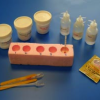
Hot and Cold
Source Institutions
In this chemistry challenge, learners discover that many chemical reactions involve heat loss or gain.

Blind Spot
Source Institutions
In this activity, learners conduct a simple test to find their blind spot.
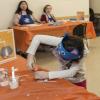
Rocket Reactions
Source Institutions
The "Rocket Reactions" activity is an exciting way to learn about how materials interact, behave, and change.

Human Battery
Source Institutions
Learners place their hands on different metals and use an ammeter to monitor the flow of electricity from one metal to another.
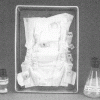
Diaper Dissection
Source Institutions
This is written as a display, but can easily be adapted to a hands-on activity. Learners discover how all the parts of a diaper work together to keep babies dry and comfortable.

Thirsty Candle
Source Institutions
In this activity, learners will explore the dynamics of air pressure by using a candle, a cup, and a dish of water.

Dancing Spaghetti
Source Institutions
In this chemistry activity, learners use spaghetti to explore density and chemical reactions.
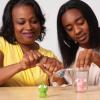
Molecules in Motion
Source Institutions
"Molecules in Motion" explores how materials behave and change in a vacuum.

Rock Bottoms
Source Institutions
Learners add acid rain (nitric acid) to two cups that represent lakes. One cup contains limestone gravel and the other contains granite gravel.
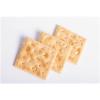
No Saliva, No Taste?
Source Institutions
In this activity (4th activity on the page), learners test to see if saliva is necessary for food to have taste.
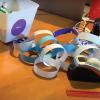
Paper Chain Testing
Source Institutions
Learners will do an experiment to determine which type of paper is strongest while focusing on variables and collecting data.
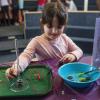
Build A Battery
Source Institutions
The Let's Do Chemistry "Build a Battery" activity lets participants learn how batteries work and how materials behave, change, and interact by building their own simple battery out of metal and felt w
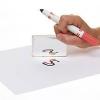
Mirror, Mirror
Source Institutions
In this activity, learners discover that it is difficult to trace a curve by using its reflection in a mirror. Use this activity to discuss how the brain works.

DNA Extraction: Look at your genes!
Source Institutions
Extract your DNA from your very own cells! First, learners swish salt water in their mouth to collect cheek cells and spit the water into a glass.

What's Your Blood Type?
Source Institutions
In this activity, learners perform a simulated blood test procedure.

DIY Elephant Toothpaste
Source Institutions
In this activity, learners will experiment with catalysts to create an at-home version of elephant toothpaste.
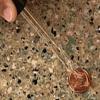
Penny Drop
Source Institutions
In this quick activity about the properties of water (page 1 of PDF under SciGirls Activity: Malformed Frogs), learners will use an eyedropper to slowly place one drop of water at a time onto a penny,
